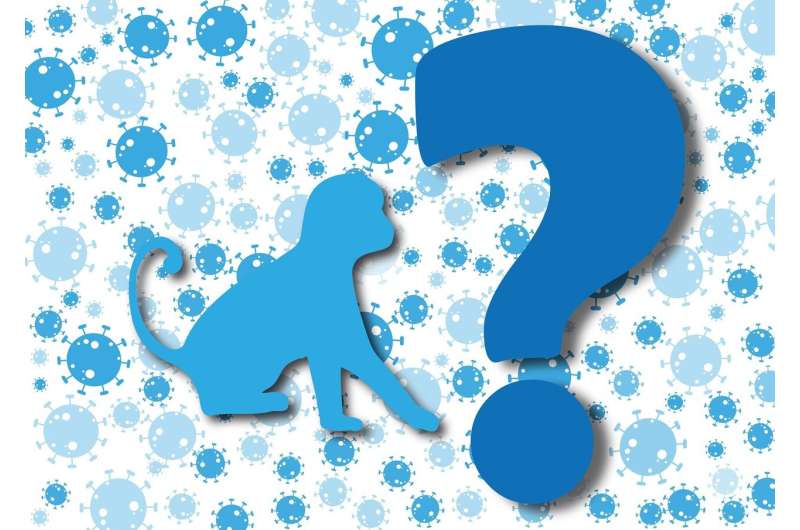Your monkeypox questions answered as vaccine access expands

As monkeypox spreads across the United States, there are now documented cases in Los Angeles County. As of July 25, there were 162 confirmed cases in Los Angeles County and at least 3,400 cases in the United States, prompting fears of another coronavirus-style outbreak.
Monkeypox, however, is an entirely different virus. It is not a respiratory illness like COVID-19, notes Dr. Omai Garner, director of clinical microbiology for UCLA Health.
"It's a different disease and it's not the kind of thing that transmits like COVID does," Garner said. "Still, it's a new outbreak and we need to take the lessons we learned from COVID and use them now."
Access to vaccines to protect against monkeypox is expanding across the country, including in Los Angeles County, where some 24,000 doses are now available. Given the limited supply, vaccines are being offered by the county department of public health to select individuals:
- People who've had high-risk contact with infected individuals;
- those who've attended an event where there was high risk of exposure to someone with a confirmed case of monkeypox;
- gay or bisexual men and transgender adults who have been diagnosed with gonorrhea or early syphilis, take HIV pre-exposure prophylaxis medication or attended or worked in a venue where they had anonymous sex or sex with multiple partners.
People who meet these criteria should contact their primary care physician to learn more about getting vaccinated.
Here's what you need to know about monkeypox:
What is monkeypox?
Monkeypox is a zoonotic disease originally transmitted from animals to humans. The virus is endemic in West and Central African countries and cases are often found near tropical rainforests where animals may carry the virus. These animals include squirrels, rodents such as dormice and the Gambian pouched rat and different species of monkeys, according to the World Health Organization.
Monkeypox is rare in humans and causes symptoms similar to but milder than those of smallpox, which was declared eradicated in 1980.
Is monkeypox a new virus?
Monkeypox is not a new disease, but it is rare and cases don't typically occur in the U.S. Typically, infections in the U.S. are associated with travel to West or Central Africa or contact with imported animals that are infected.
The recent outbreak of monkeypox in nations where the virus isn't ordinarily found appear to have spread through human-to-human contact.
How is monkeypox transmitted?
Monkeypox is far less transmissible than COVID-19 or other respiratory illnesses, said Dr. Dan Uslan, co-chief infection prevention officer for UCLA Health.
Human-to-human transmission generally occurs through direct contact with skin lesions, bodily fluids or contaminated items, such as sheets or clothing, that have been in contact with fluids or sores.
The virus can also be transmitted through respiratory droplets, but these droplets typically don't travel more than a few feet and prolonged face-to-face contact is required. Transmission through brief contact, such as walking past an infected person, has not been reported.
Many of the monkeypox cases reported in Europe, Australia and North America have occurred in people who self-identify as men who have sex with men. These individuals have presented with lesions in the genital area.
What are the symptoms of monkeypox?
The onset of monkeypox symptoms is typically five to 21 days after exposure. Symptoms often begin with fever, swelling of the lymph nodes, body aches and fatigue. Ultimately, symptoms include a rash of bumps and blisters, which may begin on the face or hands and spread to other parts of the body. With this outbreak many of the lesions have been confined to the genital area.
Monkeypox lesions may go from being flat to bumps to fluid-filled blisters that can be painful. The lesions eventually scab over and fall off. The illness typically lasts two to four weeks.
Monkeypox blisters are generally larger than those associated with chickenpox.
Can I get tested for monkeypox?
Testing requires clinical evaluation, Garner said. Testing is readily available at UCLA.
Individuals who think they might have monkeypox should contact their primary care doctor, who can assess symptoms and possible exposure and refer them for testing. People who don't have a primary care doctor can call 211, the county help line.
What happens if someone tests positive for monkeypox?
Most cases of monkeypox do not require hospital admission and individuals recover at home.
There are designated hospitals throughout Los Angeles County—including UCLA Health—that are equipped to handle patients who have monkeypox and require hospital admission.
Investigational treatments are available through the national stockpile for patients with severe symptoms and who require treatment.
Health care workers in these settings need to wear the same kind of full-body personal protective equipment used to protect against COVID-19.
What is the risk of getting monkeypox?
Despite the outbreak and recent increase in cases, the risk of contracting monkeypox remains "very low," health officials say.
"At this time, there is no cause for alarm and cases are quite limited, but UCLA Health has been carefully monitoring the rapidly evolving monkeypox situation and guidance from public health authorities," Uslan said. "We have reviewed and updated our protocols and are well-prepared to care for a monkeypox case at UCLA Health."





















